Features
We Actually Need to Do Something About the Adulterated Foods in Our Markets

Ever wondered if the groundnut oil you bought is truly groundnut oil? Or if that mango you are eating is fresh from the farm like all the sellers claim? Ever bought food from your favourite mama put and it is suddenly tasting one kain? Well, it seems some Twitter users may have found what the problem is.
My wife just told me that some sellers of cooking oils in the market add shea butter, fat, bleached palm oil to augment the size of the oil
Just like those that add colouring to crayfish
I saw this and it said the same thing, be careful where you get your oil
RT#SlowPoison pic.twitter.com/tZ6KkwZBCm
— Aproko Doctor (@aproko_doctor) September 12, 2020
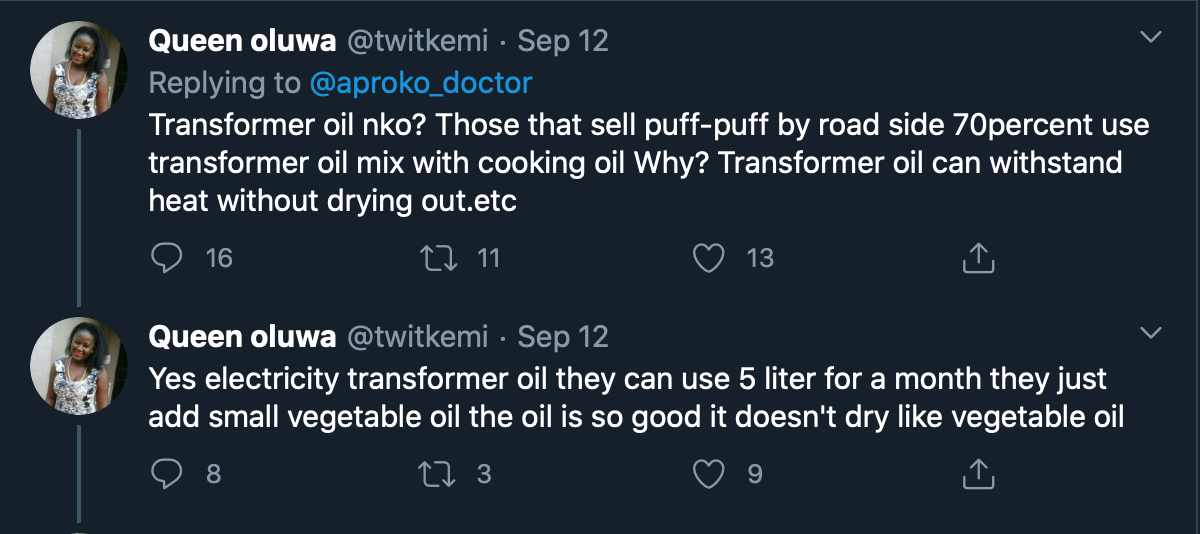
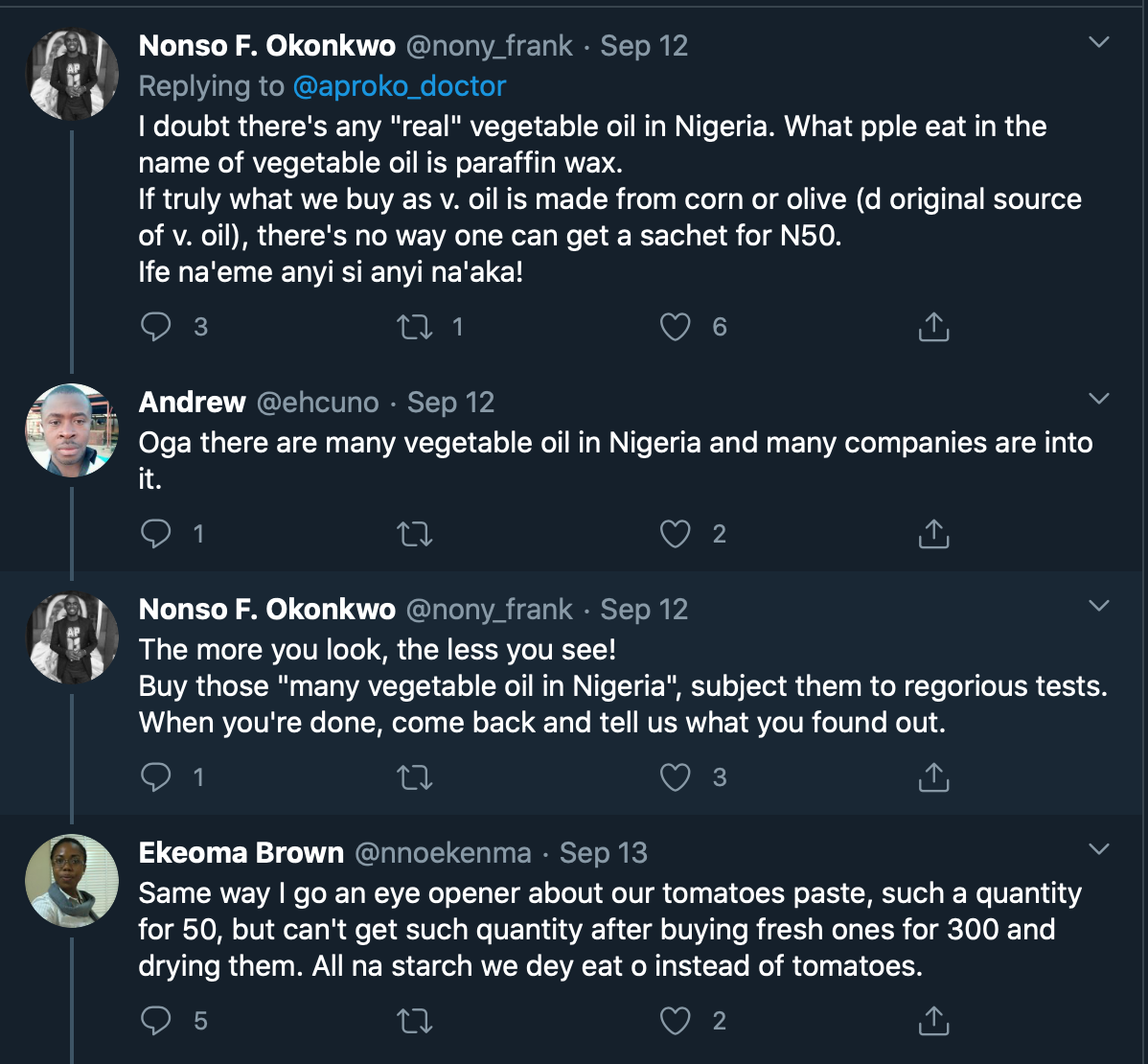
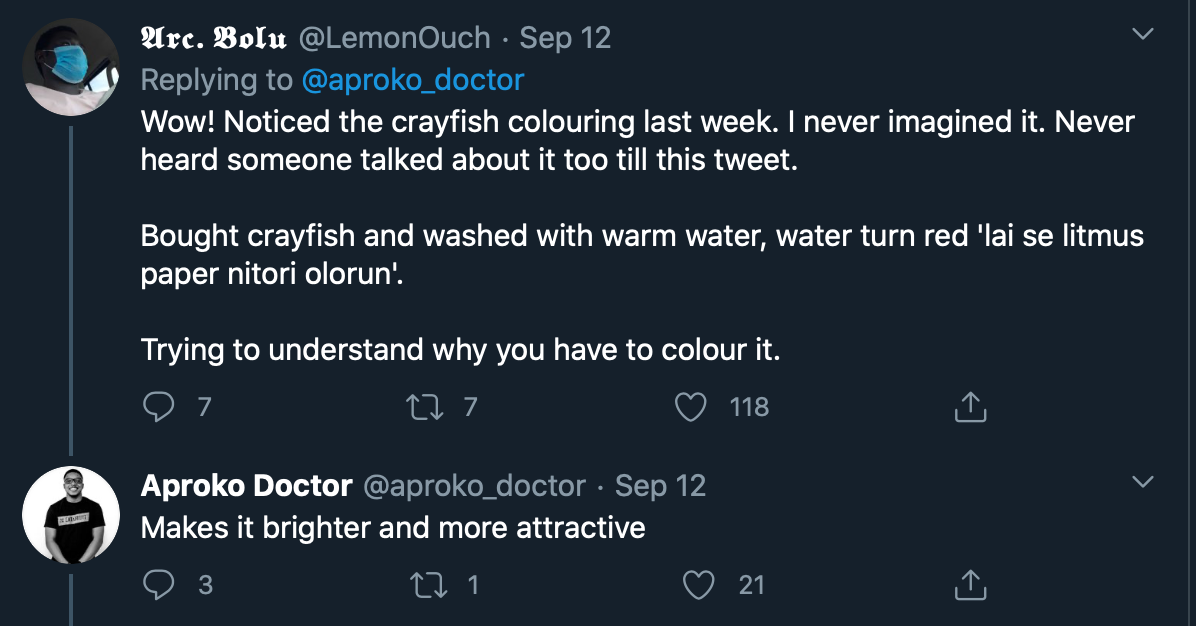

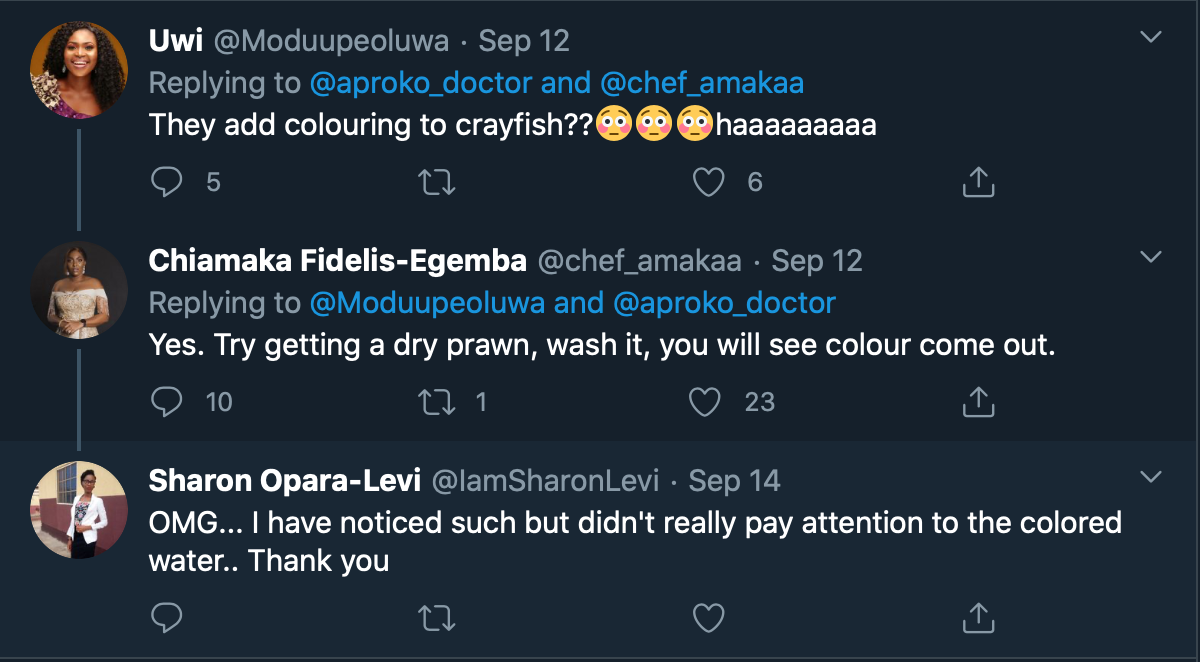

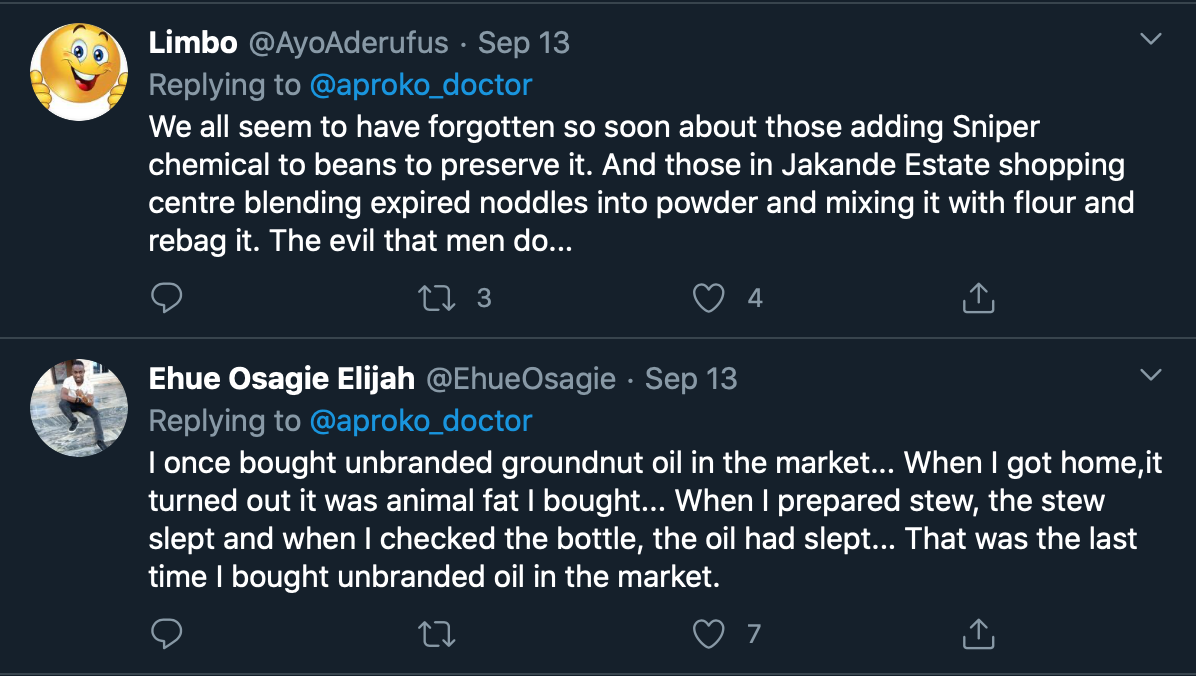


This is not the first time videos like the one Aproko Doctor shared have circulated on Twitter. In March, a video of a fruit seller washing his mangoes in the gutter went viral.
Pleasssssse #Watch #Mango washed in gutter water pic.twitter.com/in50xFBBCj
— ⭐️Stella Blaize?CEO@EduMarshals official page (@STELLABLAIZE) March 26, 2020
In July 2019, the video of a seller spraying the insecticide Sniper on his stockfish also went viral.
Why are Nigerians this wicked ? These people legit use Sniper to preserve stock fish. You should be careful who you buy stock fish from please. pic.twitter.com/TOn0yt8QIH
— Olúyẹmí Fásípè ?? (@YemieFASH) July 1, 2019
According to Jide Ojo, local butchers have been accused of using Formalin to drive away flies from their meat. Some fruit sellers use it as well to preserve their fruits from going bad. Frozen chicken is also injected with steroids to increase its size. Plantain and banana sellers allegedly use ashes and carbide to quicken ripening.
This Formalin used to preserve meat and fruits is highly toxic to humans in small amounts and is classified as a carcinogen. Its ingestion is known to induce acute poisoning, causing irritation, often leading to dry skin, dermatitis, headaches, dizziness, tearing eyes, sneezing and coughing, and even the development of allergic asthma.
In February this year, the Osun State government warned caterers and food vendors against the use of paracetamol to tenderise the meat while cooking, and using bleach detergent for cassava processing to induce the whiteness of fufu and garri.
All these point out one fact: when it comes to food sold in marketplaces, we are not safe. The puff-puff you eat at the bus stop could have been fried with transformer oil. The meat you ate at your favourite buka could have been cooked with many sachets of paracetamol.
As of 2019, over 25 million Nigerians were said to be living with acute kidney failure. Although there is no study that shows that adulterated food are the major causes of kidney failure among Nigerians, Dr. Suraj Godara, consultant nephrologist and transplant physician, explains that…
Whatever substances we consume goes to blood and it is the blood which takes the substances to each and every part of the body putting all organs at risk of developing diseases including kidney.
A doctor on Twitter also explained the health implication of cooking meat with paracetamol on the liver and kidney.

In 2016, Alfred Ihenkuronye, a Professor of Food Science and Technology, said that no fewer than 200,000 persons die annually of food poisoning.
Food adulteration is a big deal in Nigeria, just like us, you might be wondering why people still sell adulterated food items when they know that it is slowly killing people. The first reaction to these videos would be to scream, “Nigerians are wicked o” or “Nigerians will do anything for money.”

While the indignation against the action of these sellers is righteous, we need to realise that many other factors also come to play.
Ignorance
As in the case of the seller putting sniper in the stockfish and beans and those who cook meat with paracetamol, it is glaring that a lot of these vendors do not know the implication of their actions. To them, they are just saving money, time and cost, all these health talks are just stories for the gods.
The get-rich-quick syndrome
The meat cooking faster means that they get to save gas or reduce the stress of cooking with firewood. They also get to sell larger portions of food. Preserving the stockfish, beans, or fruits with sniper or Formalin also helps it last longer if they don’t make immediate sales. You see? It’s a win for them.
Whenever a tanker falls, spills its content on the floor, and people scoop to sell to unsuspecting customers, they make a lot of profit from something they spent little to get. It is the same with getting animal fat and selling it as groundnut oil, as opposed to buying groundnut oil and reselling it. Some of these sellers know the health implications but do not care, as long as they make their dough.
No Consequences
When people can get away with doing the wrong things, they’ll always do it again. But how can road sellers who sell adulterated food items be brought to book? How can those who fry puff puff with transformer oil be arrested? How many you wan catch? How would you know them sef, especially since this mostly occurs at the grassroots level? Perhaps if there is an institution or helpline where people can report the sellers of these adulterated foods to, that’ll solve the problem to an extent.
Lack of Proper Storage Facilities
While Nigeria may not have a production problem, we clearly have a preservation and storage problem. There’s also a distribution and transportation problem. A huge gap – between the farmer and the consumer – that needs to be filled. Because of this production gap, many goods spoil while being transported from one location to another. In a bid to avoid this, a lot of farmers and sellers resort to chemicals to preserve their goods and avoid wastage. This could be avoided if the government provides a sustainable means of preservation and storage for local farmers. Perhaps they’ll be less prompted to use Sniper to preserve beans or fish.
What’s Then The Solution?
The best that can be done for now is to sensitise people about food safety and the health implications of selling adulterated food items. These messages can be done via media channels, including social media. Market people also have their associations and meetings. On such meetings, a government official can be assigned to enlighten them on the dangers of selling adulterated food items. Not just once or twice, but regularly instead.
Sensitisation should be taken to the grassroots level too, including the slums, villages, towns, and cities. If the government must use a town crier, then they should use one. Everyone must be involved if we want every citizen to remain healthy.
According to this conversation, another solution could be proper food regulation:
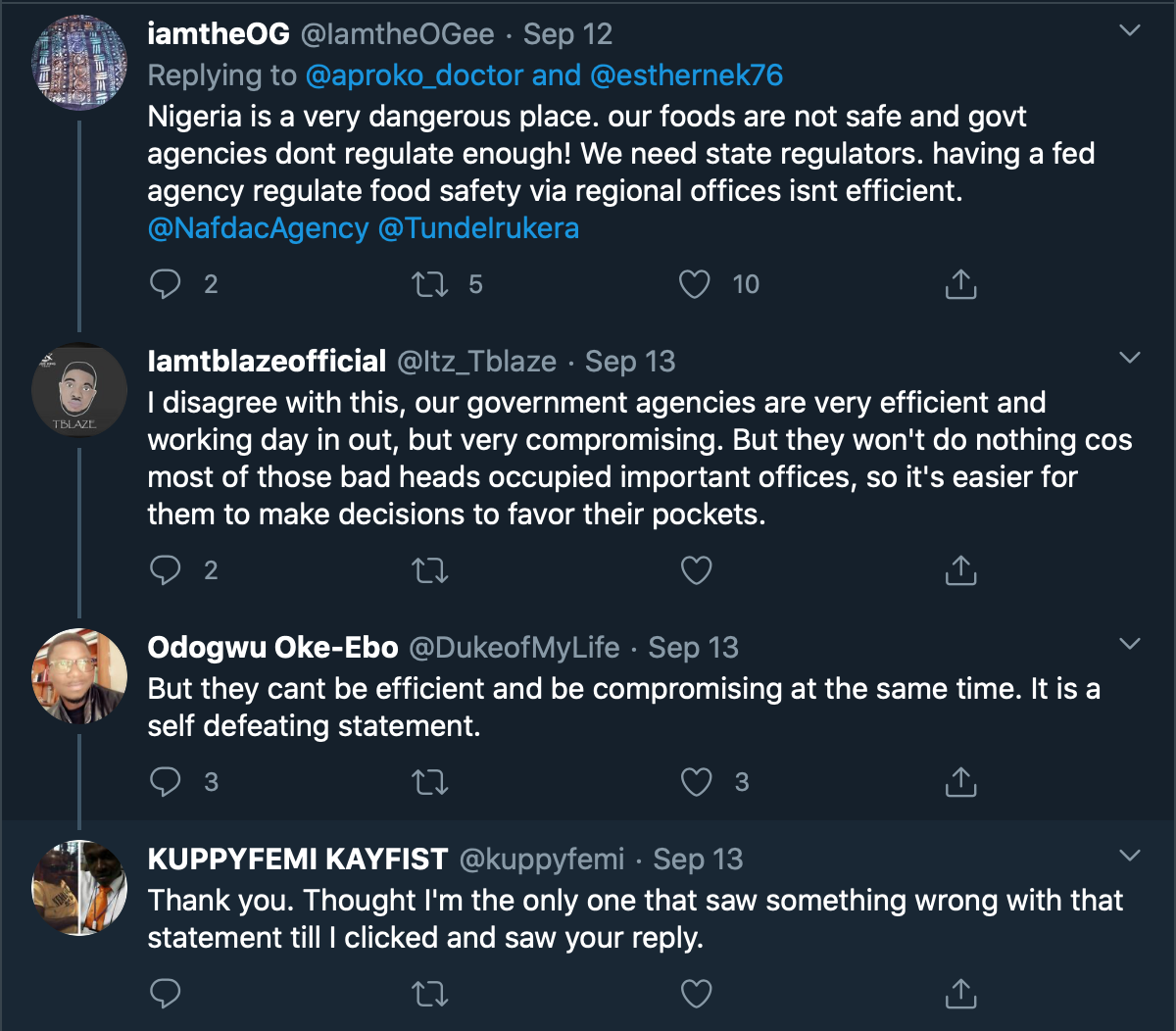
In 2018, it was reported that the Federal Executive Council (FEC) approved a draft Food Safety and Quality Bill as well as the Food Safety Institutional Reform working document. The Minister of Health said that “Nigeria will have a reduction in the incidence of food-borne illnesses through so many preventive controls that are already contained in the bill”. Well, this is 2020.
Consumers also need to be careful when buying street food or food items. It’s better to buy branded products that have NAFDAC numbers, and cook your meals yourself. If you must eat out, you could make it a once-in-a-while thing, or eat in a trusted and clean restaurant. The most important thing is to try to protect your health as best as you can.
***
Photo by Tope A. Asokere from Pexels




















